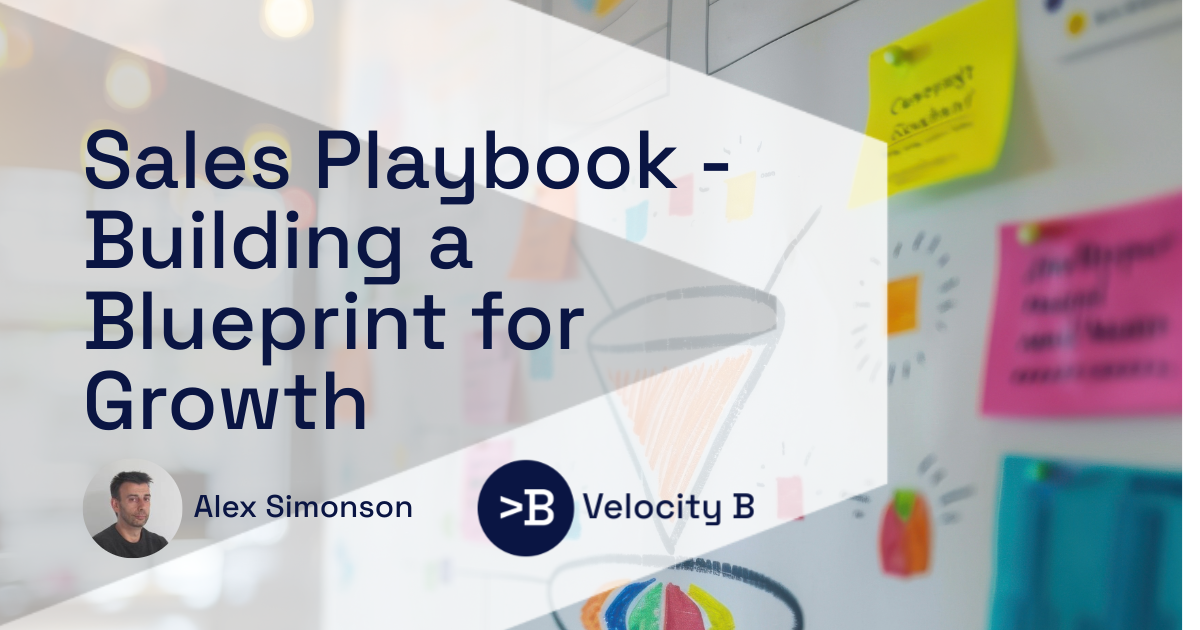Alex breaks down the numbers game that is critical to high-performing sales teams.

Alex dives into the importance of having a sales playbook, your blueprint for growth.
In the competitive SaaS startup and scale-up world, the revenue team (sales and marketing) faces a unique set of challenges. Unlike traditional product sales, successful SaaS deals are dependent on recurring revenue, customer retention, and demonstrating long-term value.
The buyer's journey has also changed. They are doing more research before engaging with a seller, are much further down their selection process, and arrive with a lot of knowledge about the solution, category, and competitors, and are ready to dive in.
Today’s sales team needs to be ready and enabled to respond to this knowledgeable buyer, meaning consistency and strategy are critical—yet many organizations still operate without a clear framework. That’s where a sales playbook comes in.
A sales playbook isn’t just a document; it’s the blueprint that aligns your entire revenue team on what works, how to execute it, and how to scale success. So why should every growing company need one—and what makes it so effective?
Ensures Consistency Across the Sales Process
One of the biggest hurdles in scaling a sales team is maintaining consistency. Without a defined process, each salesperson ends up reinventing the wheel—leading to mixed results, wasted cycles, inconsistent messaging, and missed opportunities.
A sales playbook standardizes best practices across the team. It outlines each stage of the sales funnel—from prospecting and qualification to closing and onboarding—so everyone knows exactly what’s expected. Salespeople can reference proven value propositions, email templates, and objection-handling strategies, ensuring that every customer interaction reflects the brand’s values and goals.
However, consistency doesn’t mean rigidity. A well-designed playbook provides a foundation that can be adapted to different customer types or deal sizes while still maintaining a unified voice and process.
Accelerates Onboarding and Ramp-Up Time
In fast-growing companies, rapid hiring is often necessary to meet demand. However, onboarding new salespeople can take months without a structured approach. A playbook drastically reduces ramp-up time by serving as a comprehensive training guide.
New hires can learn not only what to do but why it matters—understanding the solution, buyer personas, value propositions, and competitive landscape. Instead of relying solely on shadowing or ad-hoc coaching, they can reference the playbook to get up to speed quickly.
When onboarding is smooth and standardized, sales become productive faster, and the company can scale without sacrificing performance or customer experience.
Aligns Sales, Marketing, and Customer Success
Success doesn’t stop at the sale—it depends on renewal and expansion. That’s why alignment across departments is essential. A sales playbook acts as a unifying tool that bridges the gap between sales, marketing, and customer success.
It clarifies how leads are generated and qualified, what messaging resonates most with specific segments and personas, and how customer handoffs should happen post-sale. Marketing teams can use it to ensure campaigns target the right audience with relevant and consistent messaging. Customer success teams can use it to anticipate customer needs and maintain continuity after the deal closes.
When everyone is aligned around the same strategies and objectives, the entire revenue engine runs more efficiently.
Improves Forecasting and Data-Driven Decision-Making
A strong playbook isn’t static—it is organic and evolves based on data. By defining each step of the sales process, teams can track what’s working and what isn’t. This structure allows for accurate pipeline analysis, better forecasting, and continuous optimization.
For example, if data shows that deals stall during the demo stage, you can revisit that section of the playbook to refine talk tracks or add more targeted training. The playbook becomes a living document—constantly improving through feedback and performance metrics.
This data-driven refinement leads to smarter decisions and a more predictable revenue model, both of which are crucial when scaling your business.
Empowers Sales to Perform at Their Best
At its core, the sales playbook is about empowerment. It gives salespeople the confidence to approach every opportunity with clarity and purpose. They know how to qualify prospects, tailor value propositions, and handle objections with precision.
Rather than being micromanaged, sales have a reliable framework that supports their creativity and decision-making. This balance between structure and autonomy promotes motivation, accountability, and high performance across the team.
In today’s tech landscape, growth is not just about acquiring new customers—it’s about creating repeatable, scalable, and predictable revenue. A sales playbook is the key to achieving that. It provides clarity, alignment, and consistency while enabling your team to learn, adapt, and succeed faster.
If you are a startup building your first sales process or a scaleup looking to optimise your revenue operations, investing time in developing a comprehensive playbook will pay dividends in productivity, performance, and customer satisfaction.
In short, a great sales playbook doesn’t just guide your team—it drives your business forward.

Our Managing Partner, Alex, is a seasoned sales leader with over 20 years of experience, driving SaaS and data-led revenue growth strategies.
You can follow Alex Simonson on LinkedIn





